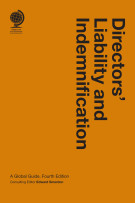Don't give up
17 July 2019
Author bio coming soon
In our latest blog, Catherine McGregor, contributor to the new Special Report, Diversity and Inclusion in the Legal Profession, discusses the significant imbalance in the legal profession and how working together can improve inclusion and diversity.
Gender diversity is often the place many organisations start their focus on inclusion and diversity. In many ways this makes sense as women do comprise half the population and the fact that we’re not advancing in anything like a proportionate way is a sad indictment of how far we all as a society still have to go. But is ‘women first’ for diversity efforts the right way to approach things? There’s definitely a significant imbalance in the legal profession between legal departments and law firms in regards to gender balance. Women enter the profession in even greater numbers than men but don’t stay or progress in firms. In legal departments the opacity of job titles and compensation structures may mask inequalities, so the picture is definitely not one of unremitting rosiness.
But does this continued lack of progress in gender equality actually reflect a fundamental issue with many inclusion and diversity efforts and why in law we’re still struggling with any kind of representative spread of identity groups vis a vis the wider population? What focusing on women; ethnicity; gender identity; sexuality or disability in isolation does, all too often, is place the need for change at the feet of the constituent identity groups, not firmly with the overarching system of inequality in which we all reside: even straight, white, advantaged, cisgender men.
What a focus on a particular identity group can do is suggest that their rights are somehow better or more deserving of attention than others. Ultimately what can end up happening is that different groups are pitted against each other either overtly or covertly within these systems which are ultimately flawed.
And that’s also true of those who have advantages or privileges and those who don’t. The majority of those with advantages did not choose them; it’s an accident of birth and it’s also a sliding scale not a zero sum game.
I’d argue that what actually needs to happen is a deconstruction of the systems of identity that form our legal workplaces and that’s very hard because ALL of us, even those who are diverse are also complicit in these systems.
This is much bigger than just more unconscious bias training – which is sadly, all too often, seen as the magic bullet of D&I. The weight of change is always going to be too heavy for any one initiative to tackle no matter how effective that is.
And as for that old chestnut of ‘merit’, which is all too often bandied about. ‘We’re just hiring/promoting on merit; it’s not about identity’: that’s the biggest piece of BS still holding progress back. We need to make sure we constantly unpick the associations and subconscious ideas that inform such concepts such as merit and success, concepts, which we may think are not associated with diversity and inclusion but really are. Do our organisations systematically define success in a way which privileges those of a certain race,gender,class etc? If you’re not sure just look at those who are deemed ‘successful’ in your organisation. If they all look and act a certain way then I’m afraid ‘Houston we have a problem’. Whose merit is it anyway? What are the markers for merit? 3 A*s and a first from Oxbridge or a part time degree as a single mother and working as a paralegal to complete the LPC?
This art of success can permeate all aspects of professional life from pipeline to progression to day to day interactions and organisational culture. Taking a much broader view but also a truly systematic view of how what we do might not be working for everyone will produce wide ranging results.
When it comes to inclusion we’re all just bozos on the bus and that can provide a healthy starting point from which to start working together to actually make some change. And it’s the working together that is key, It’s also useful to recognise that change is a constant process and one that is not linear: it can slip backwards in big ways and small ways but that’s no reason to give up on it.
Catherine McGregor, contributor to the new Special Report, Diversity and Inclusion in the Legal Profession.













Any comments - send us an email